- Home
- Blake Banner
A Harvest of Blood - An Action Thriller Novel
A Harvest of Blood - An Action Thriller Novel Read online
A HARVEST OF BLOOD
Copyright © 2018 by Blake Banner
All rights reserved.
Without limiting the rights under copyright reserved above, no part of this publication may be reproduced, stored in or introduced into a retrieval system, or transmitted, in any form, or by any means (electronic, mechanical, photocopying, recording, or otherwise) without the prior written permission of the author of this book.
This is a work of fiction. Names, characters, places, brands, media, and incidents are either the product of the author’s imagination or are used fictitiously. Any resemblance to actual events, locales, or persons, living or dead, is coincidental. This eBook is licensed for your personal enjoyment only. This eBook may not be re-sold or given away to other people. If you would like to share this book with another person, please purchase an additional copy for each person you share it with. If you’re reading this book and did not purchase it, or it was not purchased for your use only, then you should return it and purchase your own copy. Thank you for respecting the author’s work.
JOIN MY NEWSLETTER
ONE
TWO
THREE
FOUR
FIVE
SIX
SEVEN
EIGHT
NINE
TEN
ELEVEN
TWELVE
THIRTEEN
FOURTEEN
FIFTEEN
SIXTEEN
SEVENTEEN
EIGHTEEN
NINETEEN
TWENTY
TWENTY-ONE
TWENTY-TWO
TWENTY-THREE
TWENTY-FOUR
TWENTY-FIVE
TWENTY-SIX
EPILOGUE
ALSO BY BLAKE BANNER
JOIN MY NEWSLETTER
I try to publish new books often. Sometimes even two a month. I wake up, drink coffee, write stories, sleep, then repeat.
If you'd like to be notified when a new book hits the digital shelves, sign up below and I'll give you a quick heads up with direct links when that happens. Nothing more. Nothing Less.
JOIN MY NEWSLETTER
(No Spam. Ever.)
One
Is revenge any part of justice? It’s a question lawyers and philosophers agonize about in the abstract, usually over a fine malt, or a cognac, and a Havana cigar. But ask a mother whose daughter has been taken from her, raped and murdered, and she’ll tell you justice is revenge. They are the same thing.
Marni had stayed six months. Omega had left us alone. They had their hands full dealing with the press and the media, and above all, with a very aggressive select committee appointed to look into the UN fracas, and former President Hennessy’s death[1]. It was still big news, and I figured it would be for years to come. I never watch TV or read the papers anymore, but even so, it was hard to get away from the debates, the investigations, and the conspiracy theories that had sprung from it. And all of that had Omega keeping a very low profile indeed.
So they had been six idyllic months at my house in Wyoming, in the remotest place in the western world. We’d hardly seen anyone from one week to the next, and that suited us fine. We walked in the hills, fished and hunted for our food, and spent the evenings in front of the open fire, reading, listening to music, talking, laughing; healing.
But we both knew our time was limited. Omega had not gone away, and it would not be long before they came looking for us. So, as November drew to a close, I locked up the house, she packed her things, and we headed for San Francisco. There she called Professor Gibbons at Green College in Oxford and gave him a coded message that she was going back. At International Departures, she gave me one last kiss and told me she’d be in touch. The fight against Omega would continue. And as long as it did, we could not be together. It made us too vulnerable.
And next thing she was gone, swallowed by the crowd beyond the security gate, and I was alone. Again.
After that, I had driven east on the I-80, into worsening weather conditions. A weather alert had been issued. An unseasonable freezing front had been reported coming down from the Arctic across Canada and into the northwestern states. There were severe blizzards reported in North Dakota, Montana, and Idaho. It had been cold in San Francisco, but the skies had been blue and I had not expected problems driving back to Wyoming.
East of Reno, I had made a pit stop at a service station. It was three in the afternoon and I noticed that the sky in the north was turning black, and a cold wind had whipped up. I debated staying at the motel across the road, but I was seven hundred miles from home, and I’d figured I’d try and make it that night. In the Zombie 222, my modified Mustang Fastback, weather and cops permitting, I could make it in six hours and maybe beat the worst of the snow.
That was what I’d figured. So I stepped into the warm, noisy diner, found a table with a view of my car, ordered a steak sandwich and a large black coffee, and stared at the TV behind the bar. It was a current affairs talk show and Larry O’Connor was talking to Senator Cyndi McFarlane, who looked as though she was getting mad. She was leaning across the table, stabbing at the air with her finger.
“You know what makes me mad, Larry? I’ll tell you. It makes me mad that Professor Gibbons has been publicly humiliated by the press and the media across this country, not because he lied, not because former President Hennessy proved him wrong, not because he was exposed—none of those things happened. He has been ridiculed because a bunch of hecklers made him look comical on stage. But everybody—and that includes you, Larry—everybody is carefully ignoring what he said. And everybody is ignoring the fact that today, in America, we have a select committee asking the question ‘How the hell did an American-made nuclear device get into the hands of Islamic terrorists?’”
Larry played it for the camera, which obligingly closed in on his face. He smirked and said, “I don’t think everybody is ignoring it, Senator. It’s just that he looked funny up there, getting excited like that. And let’s face it, he does look like Bilbo Baggins!”
He got a laugh, but not from Cyndi McFarlane. She turned and surveyed the audience, waited for the laughter to die down a bit, and said, “Did any one of you lose somebody on 9/11?” The laughter died and Larry looked embarrassed. She went on regardless. “Anyone here out of work, or can’t afford medical care? Because let me tell you something, somebody put a nuclear device in the United Nations building. And they put it there, partly, to silence Professor Gibbons, the man you like to ridicule so much. And he was there to tell you that successive administrations, Democrat and Republican, have spent seven trillion dollars waging a war that only cost a few billion. Those seven trillion dollars are interest. Interest on money borrowed from financial institutions that belong to the friends, colleagues, and associates of the presidents in office during that war. That is not funny. You think that’s funny? I don’t. And I think it is very sad that you do.”
Larry made a comical, chastened face for the camera, but only got a small, embarrassed laugh from the audience. They were with the Senator. He cleared his throat.
“So, moving on…”
“Who said we were moving on, Larry? I’m not ready to move on.” Now she got the laugh, plus some applause. I smiled. I decided I liked her. “I am here to tell you,” she said, “and America, something important. And neither you nor your network are going to silence me. There is a web of corruption in this nation of ours. It’s a cancer that spreads clean across America, across the border into Mexico and across the sea into China and Russia in the East, and Europe and the U.K. in the west. And this corruption is controlled by a small group of men and women who will stop a
t nothing, and I mean nothing, to further their own corrupt ends. They have attempted to institute an unfettered government within the government and bend our democratic processes to allow them to rule supreme. But neither the legislature, nor the people, of this country, will allow that to happen!”
She got a lot of applause, whistles, and shouts of support, and Larry O’Connor was forced to join in. He was smiling, but you could see he was mad. I wondered if Ben and his cohorts at Omega were watching. I was pretty sure they were. Ben had told me once I could not hurt Omega. So far I had killed two of their senior members and right now I figured they were squirming in their padded leather chairs. But I wasn’t kidding myself. They would manipulate the situation, and they would end up using it to their own ends. That was what they did best.
I paid my bill and stepped back into the parking lot. It had grown dark and I was surprised at how far the clouds had spread from the north. The wind had turned from cold to bitter and I shivered as I crossed to my car.
The Zombie 222 is the creation of a couple of crazy geniuses in Texas. The body is an original Mustang ’68 Fastback. But under the hood she has twin lithium-fueled electric engines delivering eight hundred bhp, one thousand eight-hundred foot-pounds of torque direct to the back wheels. She’ll go from 0 to 60 in one and a half seconds, with a top speed of 200 MPH. And she is totally silent.
I slipped out of the lot and headed west into the gathering dark. As I chased the amber funnels of my headlamps along the endless, straight thread of the blacktop, my mind reached back. The last thing that Marni and I had discussed was where we went from here. My own plan had been to hunt down the twenty-seven members of Omega, one by one, and assassinate them. It was simple and effective, and followed the most fundamental of rules in warfare: Cut off the head and the body will die. But she had dissuaded me and begged me to let her talk to Professor Gibbons, to use his contacts and bring in more allies. I wondered vaguely if Senator Cyndi McFarlane was one of those contacts. Either way, whether she was or not, for now there was nothing for me to do but wait.
Within half an hour, the sky had turned black and it had started to snow. Fifteen minutes after that, I passed the town of Lovelock. There was no traffic on the roads, the snow was beginning to stick and drift, and for the second time I thought maybe I should stop for the night. But fate had other plans for me.
Another fifteen minutes and I found myself in a blizzard, slamming on the brakes because I had realized at the last minute that I was plowing into a intersection that shouldn’t have been there, and there was a truck bearing down on me fast from my left. I stopped with my hood three feet over the line and the truck passed within six inches of my headlamps. The blast of air rocked my car and a shower of snow, sucked up by the slipstream, smothered my windshield. The wipers cleared it, but suddenly I had no idea where I was, or how I had got there. Hindsight got busy telling me I should have stopped at a motel in Lovelock, and I was now inclined to agree with it. But hindsight wasn’t telling me how I could get back to Lovelock. I knew straight ahead would take me deeper into the storm. The intersection gave me no left turn, so I turned right and hoped for the best.
The road got dark and the snow grew heavier. I began to worry. I would soon need to recharge the lithium batteries, and if I got stranded out here in this snow I would not last long. I told myself that sooner or later I must find a service station, a motel, or even just a house. But hard as I looked, I could see no sign of life. I could see nothing at all except the blackness and the glow of the deepening snow in my headlamps.
From cruising at 120 MPH I was now down to crawling at little more than 20, and if the snow got much deeper I wouldn’t even be crawling. I’d be stuck and buried.
Eventually, after maybe half an hour or a little more, I began to see flickering lights on my right. I figured the road would eventually turn that way, but as I crawled on, the lights seemed to stay parallel. That told me there must be a turn off, an intersection, which might be hidden by the snow. But I could not afford to miss it. I needed to get to those lights. It would be ironic, I thought without much of a smile, if having survived ten years in the SAS, the worst that the Sinaloa cartel, FARC, ISIS and the Mujahidin could throw at me in hostile territory all over the world, I were finally to be killed at home, in Nevada, by a snow drift.
Ahead, the glow of my lamps picked out an irregularity on the roadside; a couple of signs, maybe a rest area, a row of mail-boxes, a fallen tree trunk… I slowed, stopped, and climbed out of the car. A million tiny knives of ice tore through my skin. I tramped unsteadily, ankle deep in snow, and saw it was a turn off that led through a blanket of darkness to the small cluster of lights flickering in the distance. There was a wooden sign by the road and I could just make out the name ‘Independence’ written on it.
I turned back to the car and saw again what I had taken to be a fallen tree trunk. It wasn’t a tree. I walked over and hunkered down, wiping the snow from the body. It was a girl, maybe fifteen years old. Her skin was white and her lips were blue. I felt for a pulse. It was hard to tell because my own hands were freezing, but I thought I felt a flutter. I opened the passenger door, picked her up, and placed her with difficulty in the seat. I had a couple of rugs and blankets in the trunk from where Marni and I had gone on picnics. I grabbed them and wrapped her as warmly as I could. Then I closed the door, got behind the wheel, and turned down the track toward Independence.
Two
It was about two and a half miles of unpaved track. The snow was settling deep and several times I almost got stuck. Eventually, after five or ten minutes, we slowly slithered and ground our way in to a kind of town square, which was actually little more than a broadening of the road. On the right, there was a row of houses, with warm light creeping around heavy drapes to touch the heaped snow on the front lawns. On the left, there was a wooden fence with a gate. Through the gate I could make out a small orchard, a path, and a large wooden building with a sign over the door that read ‘Pioneer Guesthouse’. But opposite, as an extension to the terrace of houses, there was a saloon bar that looked something like a large cottage. There were several trucks parked outside.
I left the Zombie by the gate to the guesthouse, opened the passenger door, and lifted the girl out, still swathed in rugs and blankets. She looked dead, but when I put my ear to her nose and mouth I could feel the soft, frail brush of her breath. I carried her across the small square, through the heavy fall of flakes, to the door of the saloon. I opened it with my foot and as I maneuvered myself through I shouted above the hum of voices, “I have a wounded girl here! I need a doctor! Fast! I think she’s dying!”
Absolute silence fell on the room. Maybe a dozen faces stared at me. A man and a woman behind the bar, three men in their thirties standing at that bar, two tables occupied by middle-aged couples: twelve faces, staring, silent. I roared, “A doctor! Now!” An elderly man stood. I ignored him and turned to the nearest occupied table. “You! Put two tables together!” They jumped and started moving tables. To the couple behind the bar, I bellowed, “Pillows! Cushions! Warm water!”
It was like a chicken coop when Mr. Fox drops in for a visit. There were people all over the place trying to look busy. The two couples I’d shouted at had jumped up and pushed two tables together to form a make-shift bed. One of the men had pulled off his tweed jacket and folded it to make a pillow for her head. I laid her gently down and started rubbing her hands. I noticed the elderly guy who’d stood up was taking off her shoes and rubbing her feet. He shouted suddenly, “Abi! That water! Hurry! Not too hot! Warm! Tepid even!”
“You the doc?”
“I am.” He glanced around. “Where is Sammy? Sammy!” A young man in his mid-twenties stepped up, looking apologetic.
“Yes, Doctor Graham.”
“Take over from this man! Keep rubbing her extremities. Get some warmth into her... You.” This last was directed at me. “Get a hot drink inside you!”
But I was looking at Sammy. He had his mo
uth open and he was staring at the girl’s face. I looked at the other people who had by now formed a circle around us. They all had the same expression as he had. I said to him, “Get a grip, Sammy. Start rubbing.”
I pushed through the small crowd and went to lean on the bar. I felt suddenly very tired and very cold. I saw Abi bustle out of the kitchen with a pan of warm water and make for the table. There were three men leaning against the bar next to me, watching the proceedings, and as I put my elbows on the counter, they gave me the once over. They weren’t hostile, but I got the feeling they reserved the right to turn that way. The guy behind the bar came over.
“What can I get you, mister?”
“Hot coffee, and a double whiskey. You can leave the bottle.”
He poured me a generous measure and left the bottle, then went to the kitchen to make coffee. Outside, the wind rattled the windows, whistled, and rose briefly to shriek before settling again to groaning and moaning. I drained the glass and refilled it. The guy standing next to me said, “Passing through?”
I glanced at him. He was six foot, had balding, sandy hair and pale blue eyes. He was bull-necked, had strong arms and a barrel chest. I shook my head. “Nope. I got lost in the storm. I turned right somewhere after Lovelock.”
“Where you headed?”
For a moment I thought of asking him why he wanted to know. Instead, I said, “Wyoming.”
He gave his head a small twitch to the side. “You’re four hundred mile from Wyoming. Reckon you turned south a Mill City.” He smiled. It wasn’t friendly. “Nobody ever comes to Independence on purpose.”
Behind me, I heard the doctor say they needed to get the girl to a warm bed, and to bring some hot water bottles for her. Then there was a bustle of movement and I saw them carry her into the kitchen. I figured there must be stairs there to the upper floors. I watched them go and turned back to the big guy who’d been talking to me. “Where’s your sheriff?”

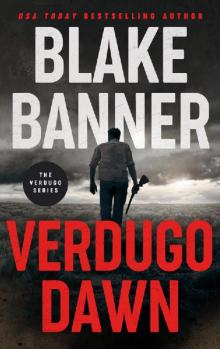 Verdugo Dawn
Verdugo Dawn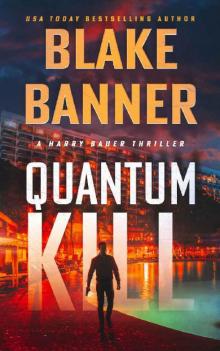 Quantum Kill (Cobra Book 4)
Quantum Kill (Cobra Book 4)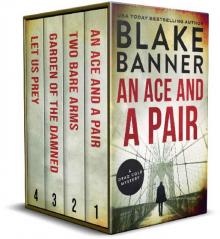 Dead Cold Mysteries Box Set #1: Books 1-4 (A Dead Cold Box Set)
Dead Cold Mysteries Box Set #1: Books 1-4 (A Dead Cold Box Set)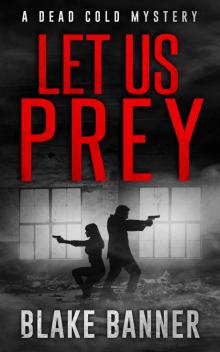 Let Us Prey
Let Us Prey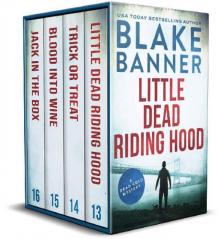 Dead Cold Mysteries Box Set #4: Books 13-16 (A Dead Cold Box Set)
Dead Cold Mysteries Box Set #4: Books 13-16 (A Dead Cold Box Set)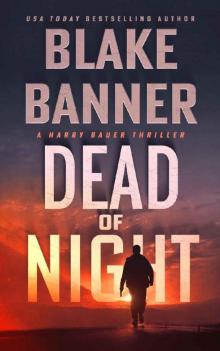 Dead of Night
Dead of Night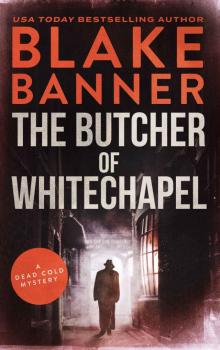 The Butcher of Whitechapel: Dead Cold Mystery 12
The Butcher of Whitechapel: Dead Cold Mystery 12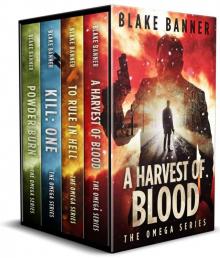 Omega Series Box Set 2
Omega Series Box Set 2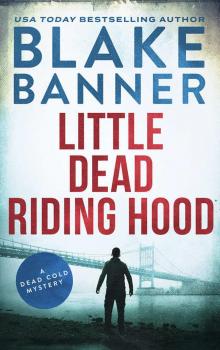 Little Dead Riding Hood: Dead Cold Mystery 13
Little Dead Riding Hood: Dead Cold Mystery 13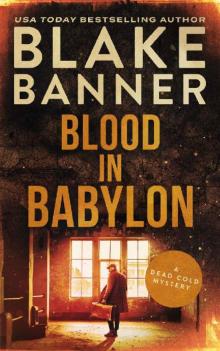 Blood in Babylon
Blood in Babylon Powder Burn
Powder Burn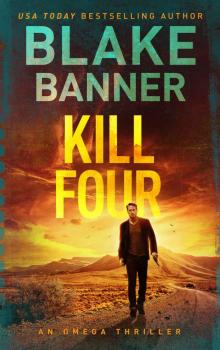 Kill Four
Kill Four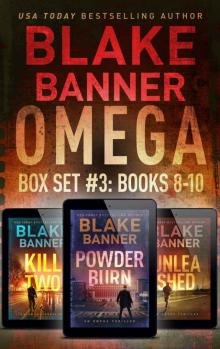 Omega Series Box Set 3
Omega Series Box Set 3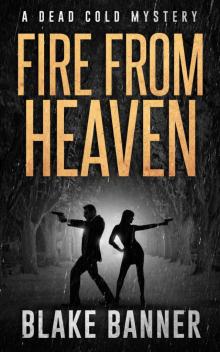 Fire From Heaven: Dead Cold Mystery 9
Fire From Heaven: Dead Cold Mystery 9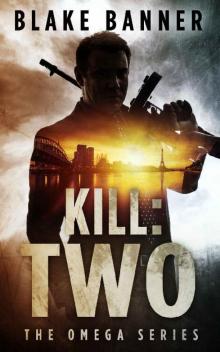 Kill - Two
Kill - Two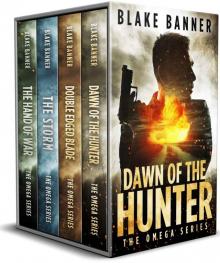 Omega Series Box Set 1
Omega Series Box Set 1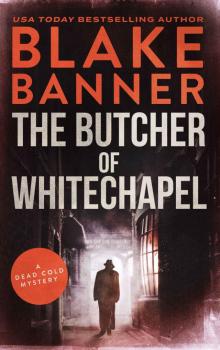 The Butcher of Whitechapel
The Butcher of Whitechapel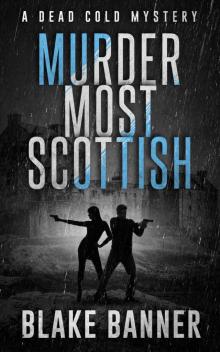 Murder Most Scottish
Murder Most Scottish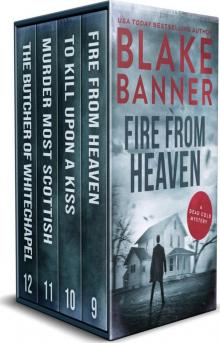 Dead Cold Mystery Box Set 3
Dead Cold Mystery Box Set 3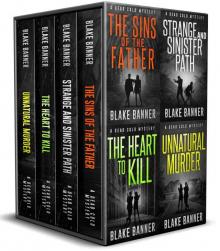 Dead Cold Mysteries Books 5-8
Dead Cold Mysteries Books 5-8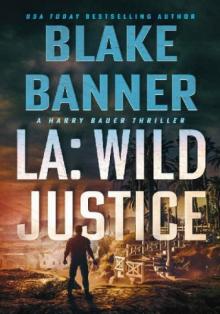 LA
LA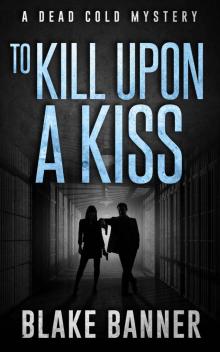 To Kill Upon A Kiss: Dead Cold Mystery 10
To Kill Upon A Kiss: Dead Cold Mystery 10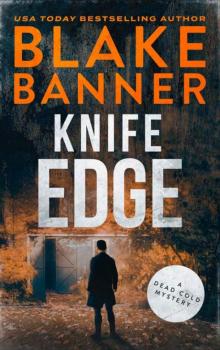 Knife Edge (A Dead Cold Mystery Book 27)
Knife Edge (A Dead Cold Mystery Book 27)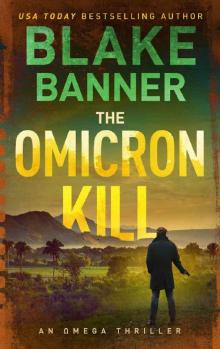 The Omicron Kill - An Omega Thriller (Omega Series Book 11)
The Omicron Kill - An Omega Thriller (Omega Series Book 11)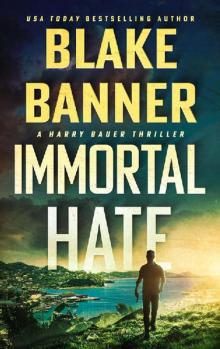 Immortal Hate (Harry Bauer Book 5)
Immortal Hate (Harry Bauer Book 5)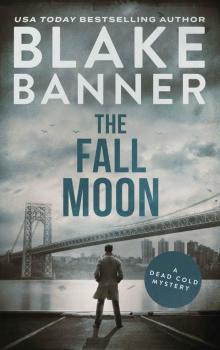 The Fall Moon
The Fall Moon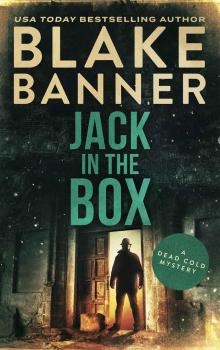 Jack in the Box
Jack in the Box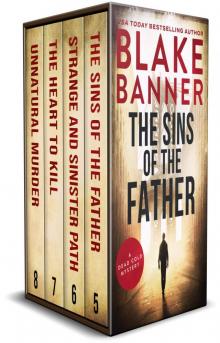 Dead Cold Mystery Box Set 2
Dead Cold Mystery Box Set 2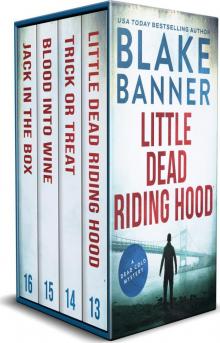 Dead Cold Mystery Box Set 4
Dead Cold Mystery Box Set 4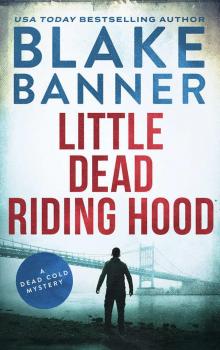 Little Dead Riding Hood
Little Dead Riding Hood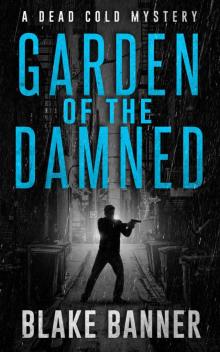 Gardened of the Damned
Gardened of the Damned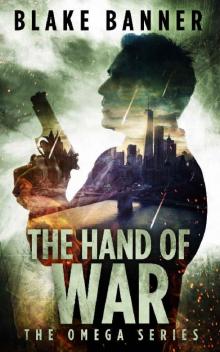 The Hand of War
The Hand of War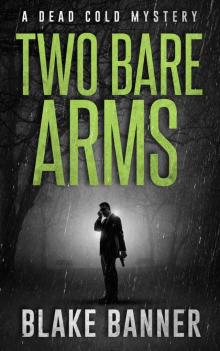 Two Bare Arms
Two Bare Arms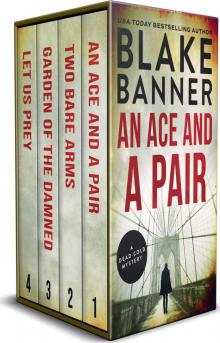 Dead Cold Mystery Box Set 1
Dead Cold Mystery Box Set 1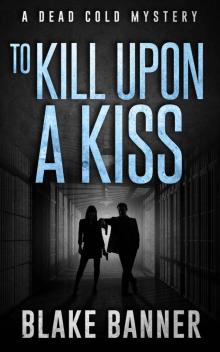 To Kill Upon A Kiss
To Kill Upon A Kiss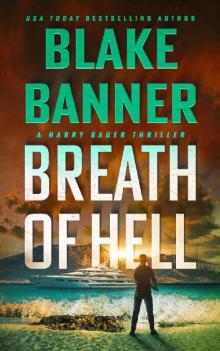 Breath of Hell (Harry Bauer Book 8)
Breath of Hell (Harry Bauer Book 8)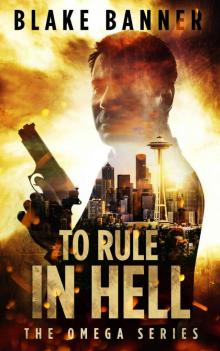 To Rule in Hell
To Rule in Hell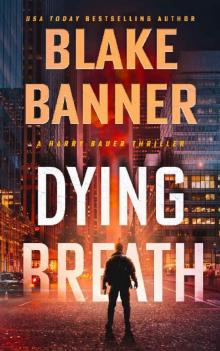 Dying Breath (Cobra Book 2)
Dying Breath (Cobra Book 2)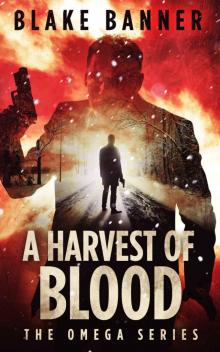 A Harvest of Blood - An Action Thriller Novel (Omega Series Book 5)
A Harvest of Blood - An Action Thriller Novel (Omega Series Book 5)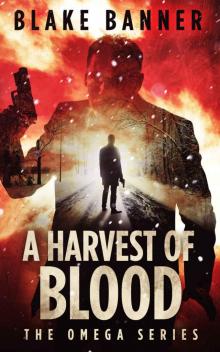 A Harvest of Blood - An Action Thriller Novel
A Harvest of Blood - An Action Thriller Novel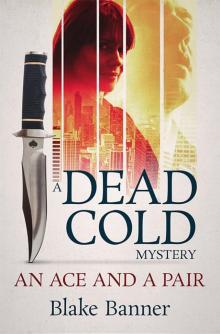 Ace and A Pair: A Dead Cold Mystery (Dead Cold Mysteries Book 1)
Ace and A Pair: A Dead Cold Mystery (Dead Cold Mysteries Book 1)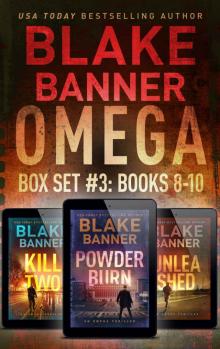 Omega Series Box Set 3: Books 8-10
Omega Series Box Set 3: Books 8-10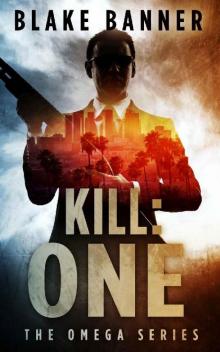 Kill One_An Action Thriller Novel
Kill One_An Action Thriller Novel The Storm
The Storm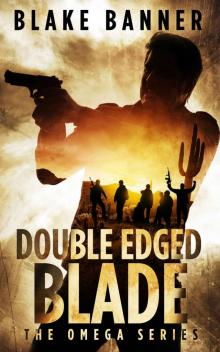 Double Edged Blade
Double Edged Blade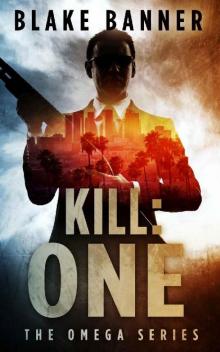 Kill: One - An Action Thriller Novel (Omega Series Book 7)
Kill: One - An Action Thriller Novel (Omega Series Book 7)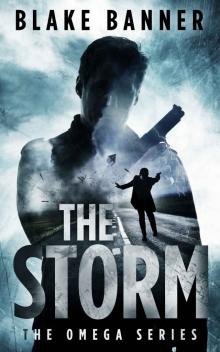 The Storm - An Action Thriller Novel (Omega Series Book 3)
The Storm - An Action Thriller Novel (Omega Series Book 3)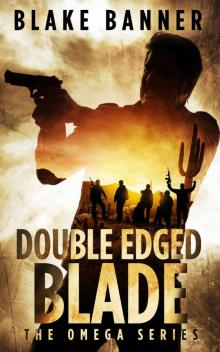 Double Edged Blade - An Action Thriller Novel (Omega Series Book 2)
Double Edged Blade - An Action Thriller Novel (Omega Series Book 2)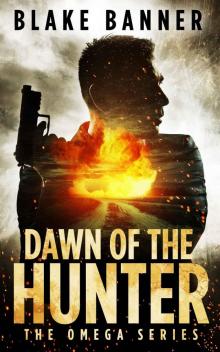 Dawn of the Hunter
Dawn of the Hunter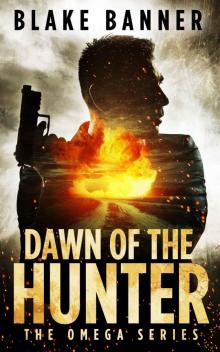 Dawn of the Hunter - An Action Thriller Novel (Omega Series Book 1)
Dawn of the Hunter - An Action Thriller Novel (Omega Series Book 1)